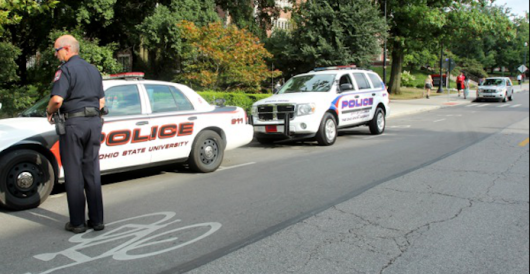Letter to the editor:
Taking responsibility for one’s own safety, as well as the safety of the community, begins with having the proper knowledge. While it’s pretty obvious you should call 911 to report a crime in progress, it’s not so obvious to everyone which other crimes might require dialing that number. Suppose there is a suspicious person hanging around outside your apartment. You know something might not be right, but what if you’re wrong? Read The Lantern’s article from Oct. 16 titled “Masturbation, indecency incidents reported off campus” and you’ll see some real-life examples of hesitation to call the police. Note the advice given by Columbus Division of Police Commander Christopher Bowling: “Don’t think twice about calling the police … If you see something that looks out of place, call. Just do us a favor and call.”
Commander Bowling provides good advice! The cops do their best work when we do our part as well by reporting possible criminal activity. The sooner we call, the sooner they can get there and perhaps catch a crook in the act. Waiting a few hours or a day, as in the news article, is not very effective!
However, let’s look at it from the witness’ point of view. Most people don’t dial 911 every day, so they’re not used to the idea. And what is obvious to a cop can be filled with ambiguity to a citizen. 911 is a great tool for quickly connecting to the proper authorities, but it’s only one tool. Remember the old saying, “If all you have is a hammer, then every problem looks like a nail?” Some people are going to question if what they’re seeing is an “emergency,” and the only “tool” they have doesn’t seem to fit.
Let’s look at this a little closer.
If you witness something truly disturbing enough to elicit an adrenaline dump, we can probably say it’s “important.” The simple three-digit 911 is not only the best choice, it will also be the easiest to use with shaking fingers. If you see a crime in progress, then a quick response is likewise indicated. But what if you aren’t sure? Do you have any other choices? Yes, you do: police non-emergency numbers.
The Columbus Police non-emergency number is 614-645-4545, while OSU police’s is 614-292-2121. At a minimum, I would recommend OSU students memorize these two numbers. Add some more if you live or work in any other police jurisdictions. Now you have a phone number to use even if you aren’t sure of the importance of your information.
There’s another reason to have the non-emergency number in your head. Sometimes, though it is quite rare, the 911 system is not operative. The other numbers give you an option, but only if you memorize them. Don’t just put them in your phone. Use your brain for a backup in case your phone is lost, broken or stolen.
Some considerations when calling for help or to report a crime or unsafe condition: First, make sure you are safe. Get away from any danger if you can before you use the phone. Second, when connected, always give your location first. If your call is dropped or you are attacked, the police dispatcher at least knows where to send the cops to check out an unknown problem. Without that location, they have nothing to go on. Finally, don’t hang up until the dispatcher tells you to. She or he needs you to answer her or his questions to the best of your ability so she or he can get that info to the responding officers. Dispatchers’ roles are crucial, as is yours.
As you’re talking on the phone, keep your head turning to try to observe everything around you. Danger doesn’t always stay in one place. There could be more going on than you first noticed.
Review the above steps. Remember that Commander Bowling wants you to call the police without even “thinking twice.” Just do it. If you still have doubts, call the non-emergency number. What to you might be ambiguous could be crucial information for police.
Consider the following scenarios:
You’re out with three friends when one of them gets in a shouting match with a stranger. After trying to de-escalate the situation to no avail, you suspect a fight is about to start. Your friend, who has a very short fuse, won’t back down or listen to reason. What do you do?
You are in your apartment when you hear a scream from outside. You pause and listen, and go to the window. You see someone outside, maybe two or three people, but you can’t tell what they’re doing. It doesn’t feel right. What do you do?
You’re at a party. More than a few people are drunk. A woman you don’t know has had a bit too much and you see a guy gently picking her up and starting to take her down a hall to another room. What do you do? Do you do anything? If so, what?
I hope you chose “dial 911” as your choice in the first two scenarios. As for the last scenario, it’s addressed in a pamphlet from Student Life’s Sexual Violence Education and Support titled “Buckeyes Got Your Back.” This resource impressed me with its clear description of the problem (sexual assault and lack of consent) and the steps to take if one observes a potential sexual assault situation. Here is the link to that pamphlet’s website: swc.osu.edu/sexual-violence/buckeyes-got-your-back/
In the meantime, you have some phone numbers to memorize.
Karl Spaulding
Campus crime prevention advocate who works for OSU’s Department of Public Safety
[email protected]
Spaulding noted his views do not represent his employer’s views.



